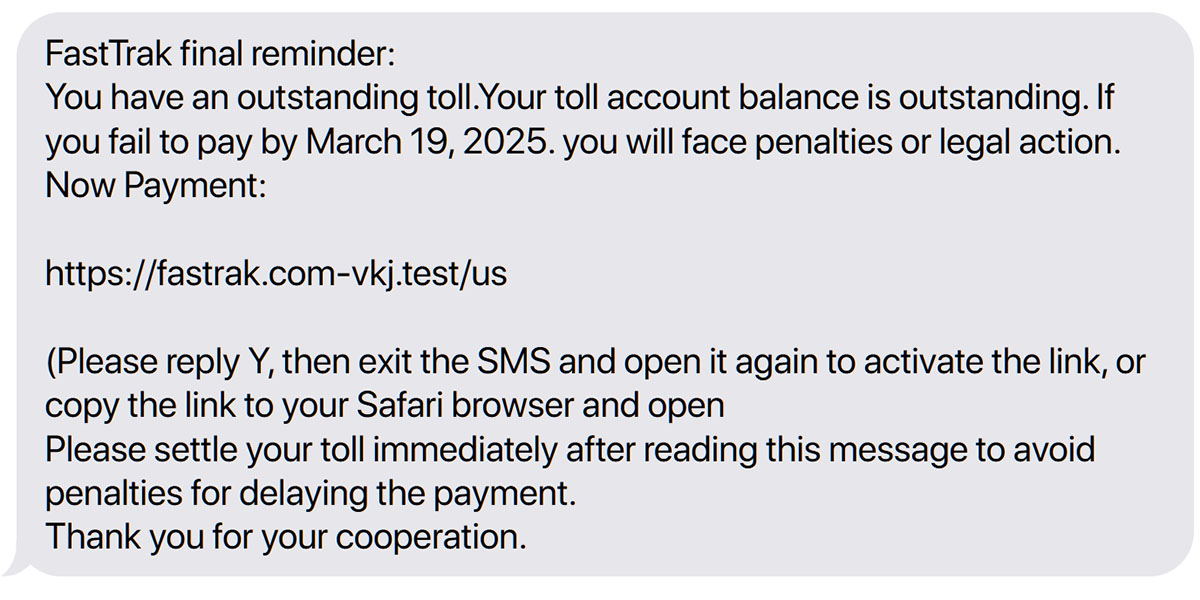If you get a text message saying that you have overdue toll charges, there’s a good chance it’s a scam. There has been a huge rise in these fraudulent texts – and clicking on the link in the text could open you up to big trouble.
What’s the Scam?
You’ll get an unexpected text or email that tells you to click a link to pay “overdue toll charges” to avoid late fees or other penalties. Clicking the link can lead to a phishing attack, where the scammer tries to get your personal information – like your driver’s license number and address – and use that information to potentially steal your identity. And if you pay, not only are you out the money, but the scammer gets your credit card number, too.
Because text messages and emails cost nothing to send, the scam is everywhere. Financial podcaster and media personality Clark Howard posted on his blog, “I’ve gotten the scam texts and also an email recently, telling me that I owe money for tolls.” The fake toll scam has become such a problem that federal agencies like the Federal Trade Commission (FTC) and the FBI are warning people to be on the lookout.
What You Should Do
Don’t click the link. If you should see one of these texts or emails – or any unexpected text or email for that matter – never click the link.
Wondering whether the message is legitimate? Visit the toll agency’s website directly using the browser on your phone or computer, or via the agency’s app on your phone. Again, do not click the link in the text or email, but navigate to the site yourself via your browser by searching for it using a reputable search engine such as Google or Bing. Once there, you can input your vehicle license plate to see if you do indeed owe any tolls.

How to Spot a Scam
Scammers are very good at mimicking emails and text messages – and even entire websites – of legitimate companies. It can be very difficult to tell them apart. No matter what the message, whether it arrives by text or email, best practice is to never ever click on the links in the message. If you get a message asking you to click on a link, you should instead go to the website manually.
Additionally, watch out for these common telltale signs of scam texts and emails:
- Urgency: Scammers use tight deadlines or phrases like “final notice” to get their victims to follow their directions without a chance to think it over or double-check.
- Threats: Fear is a strong motivator, and it’s easy to make something sound deadly serious in writing, even something as vague as “penalties” or “legal action.”
- Free Stuff: Money and prizes are also strong motivators, especially when presented at zero or minimal cost to the recipient.
- Unknown Number: Scammers may pose as someone you know or an institution you trust. However, a giveaway in this case will be their unfamiliar phone number or email. If your bank calls you unexpectedly to verify your personal information, don’t give that information away. Instead, call them back on the number on your credit or debit card.
- Typos and Grammar Mistakes: It’s not always the case, but fraudulent texts and emails will often feature spelling errors, strange punctuation, or awkwardly written sentences. In some cases, they’ll make a mistake with the organization’s name. (Note the extra “t” in “FasTrak” in the image.)
- Suspicious Links: Scam URLs will often look like those of legitimate websites, but there will be subtle differences. Like maybe the number “1” is used in the place of a lowercase “L”; or there are additional letters, numbers, or symbols.
- Strange Instructions: If the instructions you’re asked to follow seem oddly complicated, or if they’re asking for gift cards rather than a normal method of payment, it’s likely not a legitimate transaction.
Not sure if you’re on a legitimate website? The easiest way to be safe is to close the tab and manually enter the website URL, or find it using a good search engine. Otherwise, Clark Howard has a guide on how to spot a fake online store in six steps.
It Can Happen to Anyone
This article was prompted by a number of texts I got as I traveled east to Indiana from my home base in New Mexico. Every time I crossed a state line I got a text alleging that I owe a toll in the state I just left.
Given the number of axles between my pickup and travel trailer, the cost of toll roads makes it feel like I’m buying the road outright rather than paying to drive on it. So I always use my mapping software to avoid tolls in the first place. And wouldn’t you know it, when I get one of those texts and I go to the appropriate agency’s website, I don’t see that I’ve incurred any tolls at all.
Scammers are everywhere, and thankfully, this one is easy to avoid: Never click on an unexpected link, and always go straight to the source if someone tells you that you owe them money.


